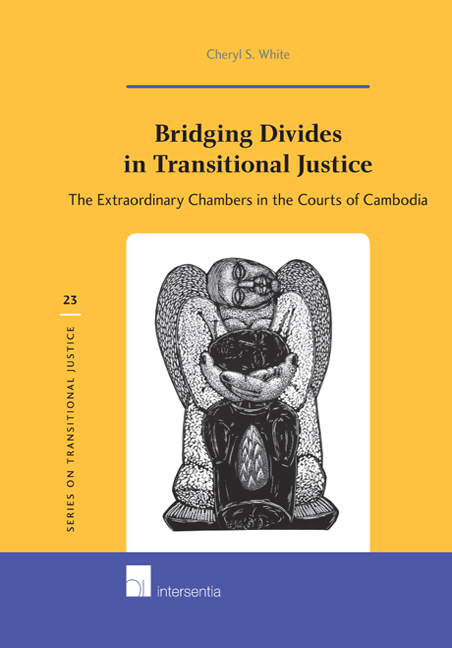Book contents
- Frontmatter
- Acknowledgements
- Contents
- Table of Cases
- Table of Legislation
- Table of Treaties
- List of Abbreviations
- Chapter 1 Introduction
- Chapter 2 Trials in Transitional Justice Theory
- Chapter 3 The Development of the Transitional Trial
- Chapter 4 The Creation of the Extraordinary Chambers in the Courts of Cambodia
- Chapter 5 Inquisitorial Criminal Procedure at the ECCC
- Chapter 6 Trial Dialogue in Case 001
- Chapter 7 The Voice of the Victim
- Chapter 8 The Voice of the Court in Judgment: Case 001
- Chapter 9 Conclusion
- Bibliography
- Index
- About the Author
Chapter 3 - The Development of the Transitional Trial
Published online by Cambridge University Press: 27 September 2018
- Frontmatter
- Acknowledgements
- Contents
- Table of Cases
- Table of Legislation
- Table of Treaties
- List of Abbreviations
- Chapter 1 Introduction
- Chapter 2 Trials in Transitional Justice Theory
- Chapter 3 The Development of the Transitional Trial
- Chapter 4 The Creation of the Extraordinary Chambers in the Courts of Cambodia
- Chapter 5 Inquisitorial Criminal Procedure at the ECCC
- Chapter 6 Trial Dialogue in Case 001
- Chapter 7 The Voice of the Victim
- Chapter 8 The Voice of the Court in Judgment: Case 001
- Chapter 9 Conclusion
- Bibliography
- Index
- About the Author
Summary
INTRODUCTION
The nature of expressivism discussed in Chapter one is reflected in the political actions creating international transitional courts. The courts and tribunals created aft er the Cold War era (1948 – 1991) were vested with the expressive capital of the international community. This chapter explores the complexity of expressivism and its limitations as the theoretical basis of international transitional trials.
The chapter provides an overview of courts making up the modern international criminal justice system and identifies the general and specific expressivism underpinning constituent courts. The expressivism of international courts is traced to the International Military Tribunal at Nuremburg in 1945 which served in large part, as a model for the ad hoc Tribunals created in 1993 and 1994 to address international crimes in the Former Yugoslavia and the Balkans respectively. I argue that the later courts exhibited an expressive surplus in terms of their goals of ending impunity and deterring perpetration of international crimes. There was a corresponding deficit in their communicative value, through lack of resonance within the communities they served.
Evolution in institutional form brought hybrid transitional courts, which, due to their blend of national and international elements, promised more locally relevant justice processes. Some courts also began to integrate victim participation schemes which introduced new voices within retributive trial proceedings. This suggested the possibility of evaluating trials from a communicative as well as an expressive basis.
PROSECUTING INTERNATIONAL CRIMES
Until recently, when a state failed to criminalise conduct or prosecute individuals where it had an obligation to do so under international law, there were few prospects of accountability for international crimes. The prosecution of individuals for criminal offences is a function of the state pursuant to national criminal law. Criminal jurisdiction stems from the notion of the sovereignty of states under international law. Jurisdiction over crimes committed within states flows from the essential territoriality of sovereignty, while the principle of nationality gives states jurisdiction to prosecute nationals extraterritorially. Under the Westphalian world order, this was easily interpreted by states as freedom of action within sovereign territory towards their citizens, with no guarantee of basic individual rights or international oversight of government actions. Internal sovereignty therefore, almost completely insulated governments and their representatives from criminal prosecution for abuse of their own citizens.
- Type
- Chapter
- Information
- Bridging Divides in Transitional JusticeThe Extraordinary Chambers in the Courts of Cambodia, pp. 47 - 96Publisher: IntersentiaPrint publication year: 2017



